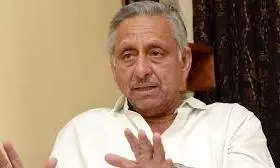
Mani Shankar Aiyar reflects on Congress, Gandhis, and the future of Indian politics
text_fieldsVeteran Congress leader and former Union minister Mani Shankar Aiyar has offered a candid perspective on the Congress party, its leadership, and Indian politics in an interview coinciding with the release of the second volume of his autobiography, A Maverick in Politics.
Speaking to The Indian Express, Aiyar discussed his time in politics, his relationship with the Gandhi family, and his views on the Congress party’s future trajectory.
Aiyar suggested that the Congress should remain open to relinquishing its leadership role in the INDIA bloc alliance, emphasizing that other leaders, including Mamata Banerjee, have the competence to lead. “The Congress will always have a major role, even if it is not the only leader,” he remarked, adding that Rahul Gandhi would likely command significant respect within the bloc regardless of its leadership structure.
According to Aiyar, Rahul and Priyanka Gandhi represent the Congress party's future. He envisions the duo as a "duumvirate" leading the party for the next three decades, with Rahul being the primary face and Priyanka playing a significant role. He dismissed any rivalry between them, stating that their collaboration is essential to the Congress’s continuity.
“The Congress believes it wouldn’t have secured even 44 seats in 2014 without the Gandhi family’s leadership. The Gandhis serve as the adhesive holding the party together,” Aiyar said, highlighting the party's trust in the family’s leadership despite challenges.
Reflecting on the Congress’s organizational issues, Aiyar noted the party's struggle with modernizing its structure. He emphasized the importance of alliances, recalling the success of the first UPA government despite the Congress holding only 140 seats. Aiyar advocated for building stronger coalition strategies to challenge the BJP effectively.
Addressing the party's internal culture, Aiyar admitted to a tradition of deference toward the Gandhi family, likening it to the BJP’s reverence for Prime Minister Narendra Modi. He described this culture as characteristic of political organizations and emphasized that members dissatisfied with it are free to leave.
Aiyar acknowledged defections as a persistent feature of democracies worldwide, attributing them to personal ambitions, ideological shifts, and changing political circumstances. Drawing parallels to historical figures like Winston Churchill, he argued that such shifts are inevitable in political systems driven by self-interest and ambition.
Aiyar described his relationship with the Gandhis as complicated, recalling instances of disagreements, including one with Sonia Gandhi over his views on tackling Naxalism. Despite being labeled a "loose cannon," he reaffirmed his loyalty to the party, stating he would never switch allegiances to the BJP.
Aiyar expressed doubts about the Congress’s ability to reform itself internally but underscored the need for alliances to secure electoral success. He concluded with optimism about the future of the party under Rahul and Priyanka Gandhi, asserting that their leadership would steer the Congress through challenging times.























